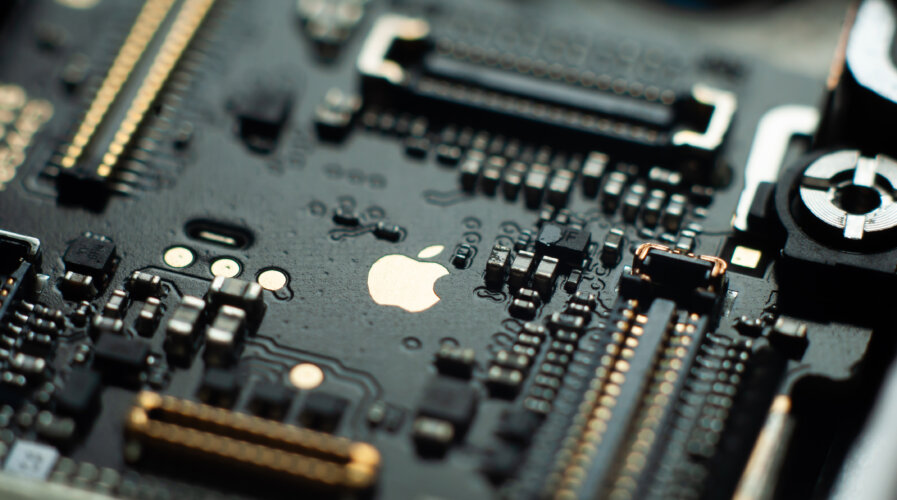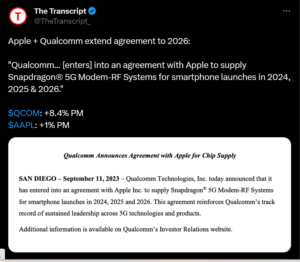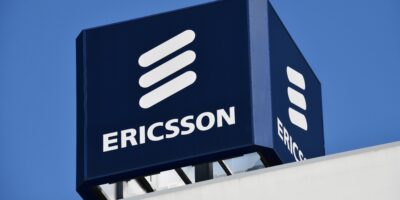
The renewed pact indicates that in-house chip design is taking longer than expected. Source: Shutterstock
Apple just renewed its deal with Qualcomm, signaling delays with in-house chips
- Apple is extending its agreement with Qualcomm to source modem semiconductors for smartphone launches in 2024, 2025, and 2026.
- The renewal suggests that Apple’s in-house chip design is taking longer than expected.
For years, Apple Inc. has been working on its in-house modem silicon technology to reduce its reliance on Qualcomm Technologies Inc., the world’s largest maker of smartphone chips. Despite this, Apple indicated in January that its initial plan to introduce its modem chips as early as this year seems unlikely.
In short, while the iPhone maker would continue working on its 5G chips, the development would certainly not be done in time for this week’s launch of the 2023 iPhones. In fact, the project may not be completed in the near future, as Apple has just extended its agreement with Qualcomm for another three years.

Qualcomm announces agreement with Apple for chip supply. Source: X
In a statement released on September 11, Qualcomm announced an agreement with Apple to supply its Snapdragon® 5G Modem‑RF Systems for iPhone launches in 2024, 2025, and 2026. The deal shows that Apple’s long-running effort to develop its modems isn’t making its way into the company’s flagship phones any time soon, despite successfully moving all its computers to its in-house processing chips.
To recall, the companies’ agreement was set to expire this year, and the latest iPhone, due on September 12, was expected to be one of the last models to rely on Qualcomm’s modem chip. Now, it seems like Qualcomm will maintain its lucrative position within Apple’s supply chain. Moreover, according to data compiled by Bloomberg, Apple is Qualcomm’s largest customer — accounting for nearly a quarter of revenue.
Quoting a report by Bloomberg, the relationship between both companies helps validate Qualcomm’s claim of having the best smartphone modem. Starting with the iPhone 12 generation, the chip has supported speedier 5G networks. Even the chip maker iterated that the “agreement reinforces Qualcomm’s track record of sustained leadership across 5G technologies and products.”
Is Apple struggling to replace Qualcomm with its in-house modem chips?
For the iPhone maker, controlling its technologies helps it integrate its products more deeply. It also means that it runs its schedule — chips take three years to develop, Apple senior vice president Johny Srouji said last year — giving them more control over costs. CEO Tim Cook has frequently noted that the company has a “long-term strategy of owning and controlling the primary technologies” behind its products.
When the Cupertino, California-based tech giant ended its 15-year partnership with Intel for Mac chips in 2020, it signaled a new direction focused on ramping up in-house capabilities. According to people familiar with the matter, Apple aims to ready its first cellular modem chips by the end of 2024 or early 2025. Apple will use its modem chips in a single device before expanding the rollout to other devices.
Overall, the transition away from Qualcomm could take up to three years, which aligns with the renewed agreement that lasts until 2026. Initially, Qualcomm had predicted that it would only provide about 20% of the 5G modem parts for the new iPhones in 2023. Still, hiccups with Apple’s in-house modem resulted in the former retaining its foothold.
Interestingly, Qualcomm forecasted that it will receive only minimal revenue contributions from Apple in fiscal 2025—a claim that could be validated if Bloomberg’s report proves accurate. To contextualize the significance of Apple to Qualcomm’s business, 22% of the former’s annual sales stems from the iPhone maker. That amount represents nearly US$10 billion, though the company has warned for years that its reliance on Apple will wane.
Broadcom’s next
As part of the shift to replace the chips in its devices with homegrown components, there are talks that Apple will also drop an essential Broadcom Inc. part by 2025. The move, should it be true, would be a blow to Broadcom, one of its biggest suppliers. The chipmaker makes a combined component that handles Wi-Fi and Bluetooth functions on Apple devices.
Apple is also Broadcom’s largest customer, accounting for about 20% of the chip maker’s revenue in the last fiscal year, almost a staggering US$7 billion. The phone has also helped fuel Broadcom’s growth; the company refers to Apple as its “large North American customer” during earnings calls. Therefore, as per a Bloomberg report in January, “the moves will further upend a chip industry that makes billions of dollars supplying Apple components.”
The upside is that Broadcom supplies Apple with other components — including radio-frequency chips and ones that handle wireless charging. Nevertheless, the iPhone maker is reportedly also working on customizing those parts. Notably, to compensate for what Qualcomm and Broadcom currently provide, Apple is already developing an in-house component that combines cellular modem, Wi-Fi, and Bluetooth capabilities.
READ MORE
- 3 Steps to Successfully Automate Copilot for Microsoft 365 Implementation
- Trustworthy AI – the Promise of Enterprise-Friendly Generative Machine Learning with Dell and NVIDIA
- Strategies for Democratizing GenAI
- The criticality of endpoint management in cybersecurity and operations
- Ethical AI: The renewed importance of safeguarding data and customer privacy in Generative AI applications


